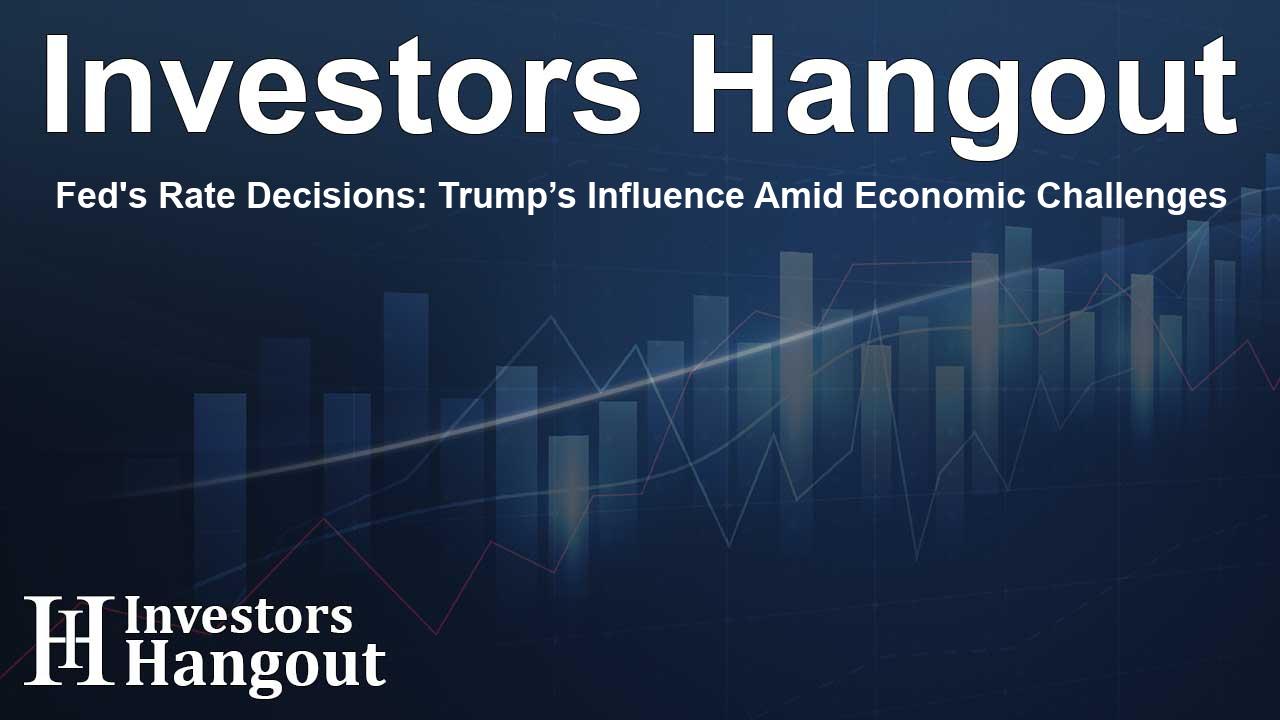Fed's Rate Decisions: Trump’s Influence Amid Economic Challenges

Understanding the Federal Reserve's Position
As economic conditions evolve, the Federal Reserve's approach to interest rates has become a topic of intense scrutiny. Investors and market analysts are paying close attention to potential shifts in policy, especially in light of recent statements from former President Donald Trump regarding rate cuts. While the Federal Reserve operates independently, the ramifications of Trump’s influence could be significant for monetary policy moving forward.
Trump's Demands for Lower Interest Rates
Recently, Trump urged for immediate cuts in interest rates, asserting that a decrease is necessary to align with his economic policy goals. He believes that lower oil prices should directly correlate with more favorable monetary conditions. By pressing the Fed for action, Trump aims to redirect focus onto his administration's broader economic strategy, which he insists will spur growth. Although the Fed is expected to maintain its current target rate at a range of 4.25% to 4.50%, the political landscape may affect future decisions.
The Market's Response
The bond market's behavior gives us clues about investor sentiment towards potential shifts in interest rates. Current futures trends suggest a nearly even probability of the Fed maintaining or cutting rates in the near term. This uncertainty reflects broader market apprehensions regarding inflation and economic growth. Analysts continue to weigh the likelihood of rate changes during the upcoming Federal Open Market Committee meetings, looking at indicators like the 2-year treasury yield compared to the effective funds rate.
Inflation Concerns and Economic Indicators
Inflation has shown signs of becoming entrenched, complicating the Fed's decision-making process. A sluggish economic recovery paired with rising costs could mean that the Fed must tread carefully as it navigates these waters. The complex interplay of fiscal policies, economic growth strategies, and inflation rates will likely shape its upcoming decisions, alongside Trump's push for rate reductions.
Economic Predictions and Future Outlook
Many economists speculate that the prospect of a rate cut might emerge more strongly in the coming months, particularly in the lead-up to significant meetings. However, the unpredictable nature of Trump’s policies can skew these predictions. Financial professionals remain divided, with some anticipating a detour from aggressive cuts based on projected fiscal measures.
Expert Opinions on the Situation
Notable economists like Ken Rogoff emphasize that the potential for cuts versus hikes remains balanced under current economic pressures. In light of uncertain fiscal policies and their potential impact on inflation, Bradley Saunders from Capital Economics notes that the timing of Trump’s policy implementation is crucial. Hence, the Fed may act cautiously, awaiting clearer signals from the White House.
Looking Forward: Will the Fed Compromise?
As the Fed approaches its policy announcements, the market's pulse on interest rates will be closely monitored. Despite Trump's desire for lower rates, the Fed's independence might lead it to resist any overt political pressures. However, his influence remains palpable, reminding us of the intricate relationship between fiscal leadership and monetary policy.
Frequently Asked Questions
1. How does Trump's influence affect the Federal Reserve?
Trump's demands for rate cuts may place additional pressure on the Fed, but the central bank retains its independence in making these decisions based on economic conditions.
2. What current interest rate is the Federal Reserve maintaining?
The Federal Reserve is currently maintaining its target interest rate in the range of 4.25% to 4.50%.
3. When might we see potential rate cuts from the Fed?
Analysts anticipate that potential rate cuts could be a possibility around the March FOMC meeting, but this is contingent on various economic indicators.
4. Why are inflation concerns significant for the Fed?
Sticky inflation can complicate the Fed's decision-making process regarding interest rates, as maintaining economic stability is a priority.
5. What are the economic implications of Trump's policies?
Trump's policies could directly influence economic activity and inflation rates, ultimately impacting the Fed's policies and the broader market.
About The Author
Contact Addison Perry privately here. Or send an email with ATTN: Addison Perry as the subject to contact@investorshangout.com.
About Investors Hangout
Investors Hangout is a leading online stock forum for financial discussion and learning, offering a wide range of free tools and resources. It draws in traders of all levels, who exchange market knowledge, investigate trading tactics, and keep an eye on industry developments in real time. Featuring financial articles, stock message boards, quotes, charts, company profiles, and live news updates. Through cooperative learning and a wealth of informational resources, it helps users from novices creating their first portfolios to experts honing their techniques. Join Investors Hangout today: https://investorshangout.com/
The content of this article is based on factual, publicly available information and does not represent legal, financial, or investment advice. Investors Hangout does not offer financial advice, and the author is not a licensed financial advisor. Consult a qualified advisor before making any financial or investment decisions based on this article. This article should not be considered advice to purchase, sell, or hold any securities or other investments. If any of the material provided here is inaccurate, please contact us for corrections.
